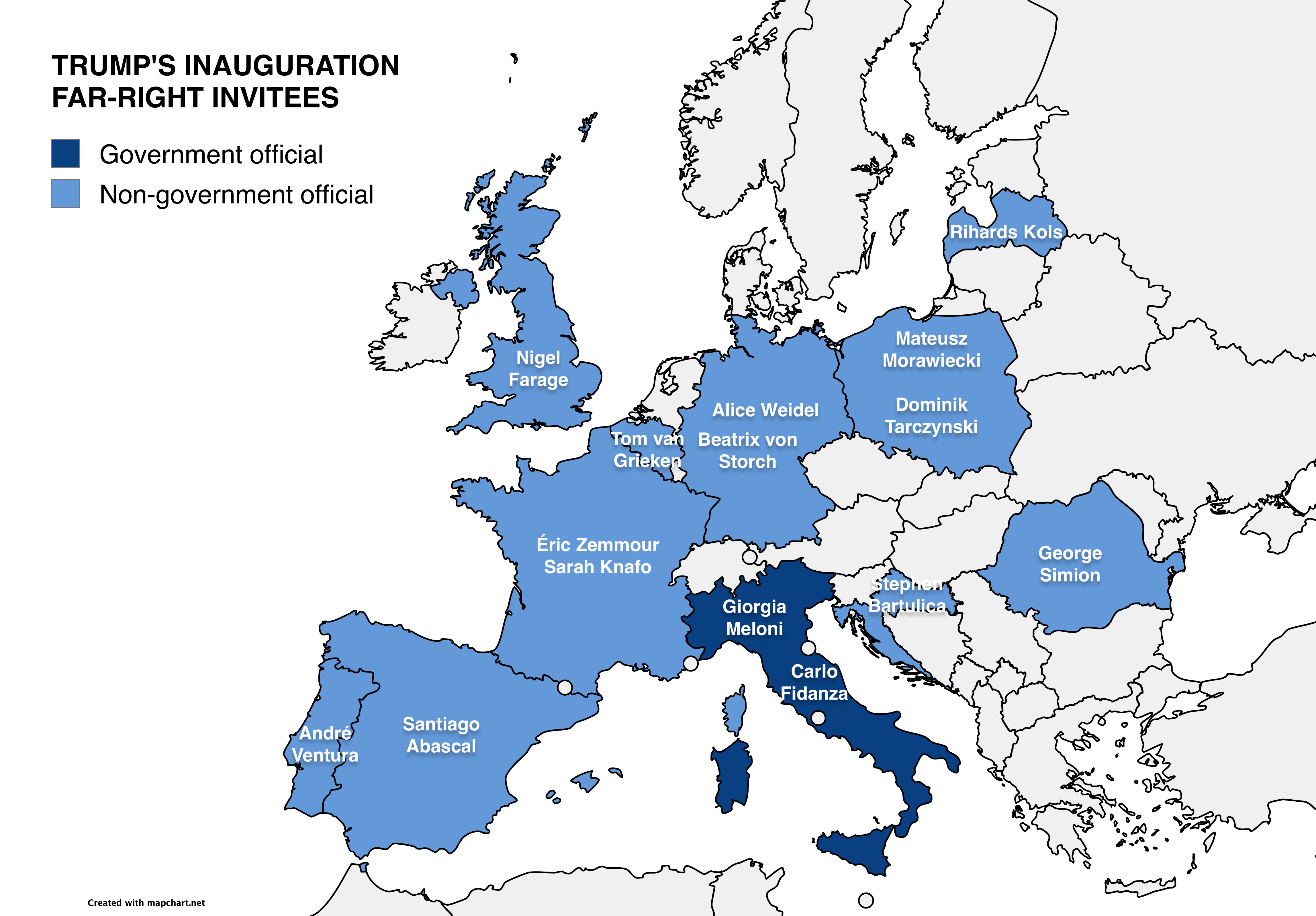Will Donald Trump’s victory reinvigorate the “Nationalist Internationale”? Typically, US inaugurations are not attended by foreign heads of state or government, but Trump’s invitation of far-right politicians from major European economies suggests a strengthening of ideological ties between significant radical forces on both sides of the Atlantic.

As indicated on the map, invitees include Italian Prime Minister Giorgia Meloni, and leaders of far-right parties such as Éric Zemmour and Sarah Knafo (Reconquête!, France), André Ventura (Chega!, Portugal), Santiago Abascal (Vox, Spain), Nigel Farage (Reform UK, UK), Tom van Grieken (Vlaams Belang, Belgium), Carlo Fidanza (Fratelli d’Italia, Italy), George Simion (Alliance for the Union of Romanians, Romania), Rihards Kols (National Alliance, Latvia), Stephen Bartulica (Homeland Movement, Croatia), Mateusz Morawiecki and Dominik Tarczynski (Law and Justice, Poland) and Alice Weidel and Beatrix von Storch (Alternative for Germany, Germany) – although the party co-leader, Tino Chrupalla, will be going instead.
A Hungarian government spokesperson confirmed that Prime Minister Viktor Orbán would not attend and clarified that he had not received an “official” invitation. While it is uncertain what happened, it is possible that he was contacted informally but declined, and therefore no formal invitation was issued. Regardless, this appears to be no more than a scheduling issue between Trump and Orbán, whose relationship remains strong. In sum, these invitees include nearly all significant far-right actors in Europe and it is noteworthy that almost no centrist European politician has been invited. Moreover, beyond Europe, invitees include far-right and authoritarian leaders such as Argentinian President Javier Milei, Chinese President Xi Jinping or Salvadorian President Nayib Bukele and Big Tech owners Jeff Bezos, Elon Musk and Mark Zuckerberg.
The inauguration invitations indicate that the ties between Trump and the far-right are likely to tighten and manifest in three ways during the next four years. First, far-right parties in Europe may gain visibility and platforms, as illustrated by Musk’s conversation with Alice Weidel, leader of Alternative for Germany (AfD). Second, these parties might receive assistance with campaigns or finances. The most concerning possibility is the third: Trump’s probable exploitation of far-right leaders or governments to block EU policies or advance his agenda. This could involve favouring Orbán or Meloni as interlocutors over EU institutions and pressuring them to exercise their veto power.
As we argue in the recent EPC Compendium on Trump’s second presidency, the EU must prepare for the worst-case scenario. The EU must exploit divisions within the far-right, for example, the fact that Marine Le Pen, leader of France’s far-right National Rally (RN), was not invited while Zemmour was. Pro-democratic forces should also avoid further normalisation of far-right policies and ideas and significantly reform the EU to avoid gridlock. This could involve the creation of a supranational governmental avantgarde composed of European countries willing to take decisive action. Moreover, the fight against big digital platforms is crucial to ensure a democratic public sphere. It is clear that Trump will aim to use the far-right against the EU but he will only succeed if the EU allows it. The EU has significant scope for action, and it is up to pro-democratic forces to fight back.
Javier Carbonell is a Policy Analyst in the European Politics and Institutions Programme at the European Policy Centre.
Tabea Schaumann is a Programme Assistant at the European Policy Centre. The support the European Policy Center receives for its ongoing operations, or specifically for its publications, does not constitute an endorsement of their contents, which reflect the views of the authors only. Supporters and partners cannot be held responsible for any use that may be made of the information contained therein.